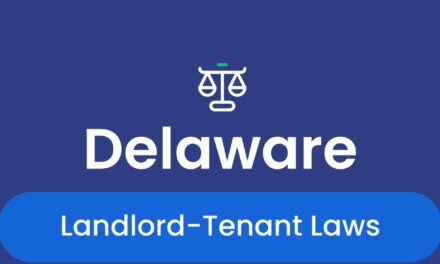Landlords and tenants in Delaware share rights and responsibilities, but maintaining that balance can at times be difficult as disputes arise. If tenants default on rent, violate the terms of their lease, or violate rules regarding the property, landlords may be forced to seek the legal route to evict tenants. This is where the Delaware eviction process comes into play. For landlords, a legal path to eviction guarantees that any eviction will be valid and enforceable. Tenants who are aware of their rights may be able to avoid illegal eviction or take the necessary steps to respond effectively in a court setting. Just as a payment processor facilitates the transaction between a business and its customers, Delaware’s landlord-tenant laws created structure around the transactions, offering protection to both parties involved. This article will explain the Delaware eviction process, including timelines, notices, and legal jargon, so that landlords and tenants have clearer guidance as they navigate the process.
Delaware Landlord-Tenant Law Basics
Delaware landlord-tenant law is found in Title 25 of the Delaware Code, in the Delaware Residential Landlord-Tenant Code. The legislature passed this law provides rights, responsibilities and remedies for owners and tenants, a critical element of rental housing serving as the legal framework within the state.

The law affords landlords the right to collect rent, access and maintain property, and evict tenants who violate lease agreements or do not pay rent by their due date. Meanwhile, landlords must also keep the rental unit in a safe, habitable condition. These include adhering to housing code, making repairs, and providing agreed-upon basic services and utilities.
Tenant rights include safe, habitable dwellings, privacy, and landlords maintaining the premises. Tenants are also responsible to pay rent timely, follow lease terms, protect the rights of neighbors, and maintain their property.
Delaware law requires that any eviction be conducted in accordance with legal procedures. Landlords may be set up for wrongful Delaware eviction claims if they skip legal steps like not sending notices or using any self-help evictions for instance changing locks or cutting off utilities. Following the Delaware Residential Landlord-Tenant Code protects both parties and also safeguards a fair housing process.
Legal Grounds for Delaware Eviction
In Delaware, landlords require legally recognized grounds in order to evict a tenant, which are specified in the Delaware Residential Landlord-Tenant Code. The most frequent cause is failure to pay the rent. Landlords may send written demands for overdue payment by tenants, sometimes including late fees permissible under the lease. A statutory grace period is not required by Delaware law; the lease itself may have one. If the tenant has not paid, the landlord can then file for eviction.

Leases violations are also a common ground for Delaware eviction. This might include unauthorized pets, unapproved persons residing in the unit, severe property damage, or illegal activity on the property. Usually, landlords must provide written notice of the violation with an opportunity for the tenant to correct it prior to initiating an eviction.
Landlords also evict holdover tenants, who remain in the building after their lease has expired without renewing. Likewise, illegal or dangerous conduct such as drug activity or conduct that endangers the health and safety of others can trigger immediate eviction filings.
Finally, landlords may go for Delaware eviction if they want to personally occupy the property like moving in themselves or selling the property.
Importantly, it distinguishes between “for cause” eviction (wherein a tenant is evicted for lack of payment or some breach of lease) and “no cause” evictions (when a landlord ends a tenancy-at-will or lease ends). Delaware rental law equally mandates strict compliance with notice and timing requirements for either, making sure that evictions are not arbitrary, but lawful.
Tenant Defenses Against Delaware Eviction
Landlords can start a Delaware eviction, but tenants have legal options that can protect them from being evicted. Improper or defective notice is one of the most common. If a landlord provides notice incorrectly, whether in terms of timing, method, or substance, the eviction can be dismissed.

Tenants are also protected from retaliatory eviction. For instance, if a tenant alerts the housing authority that his or her unit is unsafe, and the landlord in response issues an eviction action, the court may find that to be a retaliatory action, illegal under state law. Also, the Fair Housing Act prohibits discrimination against eviction by race, religion, disability, and family status.
Another possible defense would arise if the landlord maintains premises uninhabitable. If the landlord’s responsibility to make repairs is unaddressed, tenants might be able to claim the landlord failed in his role and thus the eviction is less defendable. Likewise, when a landlord accepts rent after serving an eviction notice, it may invalidate the action by signaling that the tenancy continues.
Eviction law is complex, and tenants are largely aided by legal assistance and representation. Attorneys can spot potentially legitimate defenses and protect tenants‘ rights during the process.
Common Mistakes Landlords Should Avoid
Even when a Delaware eviction is legally justified, landlords frequently misstep thereby postponing or derailing their case. A key error is to try “self-help” evictions by changing locks, shutting off utilities, or harassing tenants. These are illegal and leave landlords vulnerable to lawsuits.

Another fault is bad bookkeeping. Landlords must maintain leases, maintain proper ways to collect rent and keep rent receipts and written notices. Courts will not excuse the mistake of relying on a verbal agreement or failing to prepare and send a written notice. An eviction case may also be dismissed if filed prematurely, ignoring notice time frames, or without good cause.
Landlords should also be mindful of local housing codes; violations can complicate or invalidate the eviction process. In the end the cost of shortcuts or noncompliance is perilous; they invite lawsuits, fines and possibly eviction delays.
To succeed in a Delaware eviction, landlords must closely adhere to the law, document everything and not cut corners that might jeopardize their case.
After the Eviction: What Happens Next?
After the Delaware eviction has been granted by the court, the landlord has regained legal possession of the property. The tenant must move out, and Delaware law sets out how to deal with any belongings left behind. Landlords often have to abide by proper notice requirements, or store abandoned items temporarily, if permitted by state law.

The tenant is still liable for unpaid rent and property damages. Otherwise, they may be collected through a collections agency, or through small claims court depending on the amounts owed. Eviction judgments impose economic costs on the tenant long after eviction.
For tenants, eviction is not insignificant. It can be included on rental history reports and can lower credit scores, thereby making the search for housing more difficult.
The conclusion of the eviction process also reminds landlords of the need for tenant screening and lease enforcement. Re-establishing trust within landlord-tenant relations is key; clear guidelines, robust lease agreements, and following the law in the State of Delaware may help avoid those types of disputes in future leases.
Conclusion
The Delaware eviction process is designed to balance the rights of landlords and tenants, ensuring that disputes are resolved fairly and legally. For landlords, it provides a structured path to reclaim property when rent is unpaid, leases are violated, or tenancy ends without renewal. For tenants, it offers important protections against unlawful removals, discrimination, or retaliation.
Ultimately, the key takeaway is that knowledge of timelines, rights, and responsibilities helps prevent costly mistakes. Whether you are a landlord seeking compliance or a tenant defending your rights, understanding the eviction process in Delaware ensures that outcomes are handled lawfully and with clarity.
Frequently Asked Questions
1. How long does the Delaware eviction process usually take?
The process of Delaware Eviction can take anywhere from a few weeks to several months, depending on court schedules, notice requirements, and whether the tenant contests the eviction.
2. Can a landlord change the locks to evict a tenant in Delaware?
No. “Self-help” evictions, including changing locks or shutting off utilities, are illegal. Only the court can authorize removal.
3. What happens if a tenant pays rent after receiving an eviction notice?
In some cases, payment may stop the eviction. However, if repeated late payments occur, the landlord may still pursue eviction.
4. Are tenants given time to move after a court orders eviction?
Yes. Typically, the court sets a date by which the tenant must leave. If they fail to do so, the sheriff can enforce the order.
5. Does a the Delaware Eviction affect a tenant’s credit score in Delaware?
Yes. Court judgments and unpaid rent may appear on credit reports and rental history, making future leasing more difficult.



